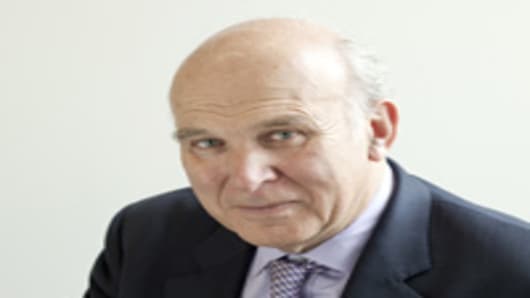Vince Cable, business secretary, has vowed to resist “bonkers” proposals to allow bosses to fire underperforming staff at will, as coalition tensions flared over a Number 10-inspired report on cutting jobs red tape.
David Cameron said he would examine the idea of “no fault dismissal”, as the publication of the so-called Beecroft report this week threatened to worsen coalition relations.
Mr Cable has had phone conversations with Ed Miliband amid signs of thawing relations between the Labour leader and the Lib Dems. The business secretary, who describes himself as a “social democrat”, is seen by Labour as an obvious channel for a rapprochement.
Mr Cable reacted angrily to reports that Mr Cameron would back the proposal for no-fault dismissal, with one official close to the business secretary saying the idea was “bonkers” and without any evidential base.
One ally said Mr Cable was surprised the prime minister was not distancing himself from the report by Adrian Beecroft, a venture capitalist and leading Conservative donor, after allegations that donations could buy influence over government policy.
“It is surprising that Number 10 backs a report by one of the Tory party’s biggest donors,” the ally said. Peter Cruddas, Tory co-treasurer, resigned in March after claiming that donors might be able to influence policy.
Many Tory MPs see the Beecroft report as a radical plan to inject growth into the economy. Mr Cameron hinted on Sunday that he sided with his MPs, even if eventually he is likely to be thwarted by the Lib Dems on no-fault dismissal.
“I am interested in anything that makes it easier for one person to say to another person: ‘Come and work for me’,” the prime minister said in Chicago on the margins of a Nato summit. “We need to examine every proposal.”
The coalition row over employment law came amid signs of improving relations between senior Labour and Liberal Democrat figures. “The lines of communication are now open,” said one senior Labour insider.
A spokeswoman for Mr Cable said he had met Mr Miliband twice since the general election and they had spoken “four or five times” on the phone. Nick Clegg, deputy prime minister, had met the Labour leader twice and spoken on the phone “a couple of times”.
A person close to Mr Clegg said the Lib Dem leader was “relaxed” about Mr Cable’s conversations because he was “in favour of plural, grown-up politics” where MPs of different parties talked to each other.
Any Lib-Lab discussions were “not about 2015 [the expected date of the next election],” he said. Instead they were largely to discuss shared areas of interest such as the reform of party funding and the House of Lords.
The spokeswoman for Mr Cable said the conversations had been about issues including bank reforms. “Like other members of the Liberal Democrats, he has always been willing to talk to other politicians to discuss important areas of public policy,” she said.
Mutual suspicion remains after Labour refused to help campaign for the alternative vote last year. The Lib Dems also believe Labour will wreck their hopes of a mostly elected Lords.
The Lib Dems face increasing hostility from many rightwing Tory backbenchers who would prefer a Conservative-only administration.
John Curtice, professor of politics at Strathclyde university, has warned Labour that it ought to improve its lines of communications with the Lib Dems because of the likelihood of a hung parliament in 2015.


